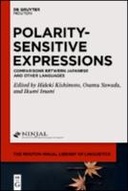Explore

Polarity-Sensitive Expressions
0 Ungluers have
Faved this Work
Login to Fave
Polarity (positive, negative) is one of the most fundamental concepts in the system of language and there are many expressions that are sensitive to polarity. For example, any in English and wh-mo in Japanese appear in negative contexts, but not in positive contexts. While previous studies have shown that polarity-sensitive expressions are a general phenomenon in languages, it has also become clear that there are variations in polarity-sensitive expressions. This volume explores the variations in polarity-sensitive expressions through comparisons between Japanese and other languages, such as English, German, Spanish, and Old Japanese, and examines the environments and contexts in which polarity-sensitive expressions occur, as well as the types of (cross-linguistic) variation allowed. The value of the present volume lies in its inclusion of research papers inquiring into various types of polarity-sensitive expressions, such as negative-, positive-, and discourse-sensitive polarity items as well as their variations. The research indicates new directions for the study of polarity-sensitive expressions in the fields of syntax, semantics, pragmatics, historical linguistics, corpus linguistics and psycholinguistics. ; Polarity (positive, negative) is one of the most fundamental concepts in the system of language and there are many expressions that are sensitive to polarity. For example, any in English and wh-mo in Japanese appear in negative contexts, but not in positive contexts. While previous studies have shown that polarity-sensitive expressions are a general phenomenon in languages, it has also become clear that there are variations in polarity-sensitive expressions. This volume explores the variations in polarity-sensitive expressions through comparisons between Japanese and other languages, such as English, German, Spanish, and Old Japanese, and examines the environments and contexts in which polarity-sensitive expressions occur, as well as the types of (cross-linguistic) variation allowed. The value of the present volume lies in its inclusion of research papers inquiring into various types of polarity-sensitive expressions, such as negative-, positive-, and discourse-sensitive polarity items as well as their variations. The research indicates new directions for the study of polarity-sensitive expressions in the fields of syntax, semantics, pragmatics, historical linguistics, corpus linguistics and psycholinguistics.
This book is included in DOAB.
Why read this book? Have your say.
You must be logged in to comment.
Rights Information
Are you the author or publisher of this work? If so, you can claim it as yours by registering as an Unglue.it rights holder.Downloads
This work has been downloaded 39 times via unglue.it ebook links.
- 39 - pdf (CC BY-NC-ND) at Unglue.it.
Keywords
- Cross-linguistic variation
- Grammar, syntax & morphology
- Historical & comparative linguistics
- Japanese
- Japanisch
- Language
- Linguistics
- Polarität [Grammatik]
- polarity
- Polarity-Sensitive Expressions
- Semantics, discourse analysis, etc
- thema EDItEUR::C Language and Linguistics::CF Linguistics
- thema EDItEUR::C Language and Linguistics::CF Linguistics::CFF Historical and comparative linguistics
- thema EDItEUR::C Language and Linguistics::CF Linguistics::CFG Semantics, discourse analysis, stylistics
- thema EDItEUR::C Language and Linguistics::CF Linguistics::CFK Grammar, syntax and morphology
Links
DOI: 10.1515/9783110755121Editions

